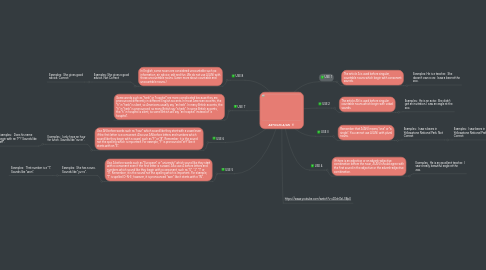
1. USE 5
1.1. Use A before words such as "European" or "university" which sound like they start with a consonant even if the first letter is a vowel. Also use A before letters and numbers which sound like they begin with a consonant, such as "U", "J", "1" or "9". Remember, it is the sound not the spelling which is important. For example, "1" is spelled O-N-E; however, it is pronounced "won" like it starts with a "W".
1.1.1. Examples: She has a euro. Sounds like "yu-ro".
1.1.1.1. Examples: That number is a "1". Sounds like "won".
2. USE 6
2.1. Use AN before words such as "hour" which sound like they start with a vowel even if the first letter is a consonant. Also use AN before letters and numbers which sound like they begin with a vowel, such as "F" or "8". Remember, it is the sound not the spelling which is important. For example, "F" is pronounced "eff" like it starts with an "E".
2.1.1. Examples: I only have an hour for lunch. Sounds like "au-er".
2.1.1.1. Examples: Does his name begin with an "F"? Sounds like "eff".
3. USE 7
3.1. Some words such as "herb" or "hospital" are more complicated because they are pronounced differently in different English accents. In most American accents, the "h" in "herb" is silent, so Americans usually say "an herb". In many British accents, the "h" in "herb" is pronounced, so many British say "a herb". In some British accents, the "h" in hospital is silent, so some British will say "an hospital" instead of "a hospital".
4. USE 8
4.1. In English, some nouns are considered uncountable such as: information, air, advice, salt and fun. We do not use A(AN) with these uncountable nouns. (Learn more about countable and uncountable nouns.)
4.1.1. Examples: She gives a good advice. Not Correct
4.1.1.1. Examples: She gives good advice. Correct
5. USE 4
5.1. If there is an adjective or an adverb-adjective combination before the noun, A(AN) should agree with the first sound in the adjective or the adverb-adjective combination.
5.1.1. Examples: He is an excellent teacher. I saw a really beautiful eagle at the zoo.
6. USE 1
6.1. The article A is used before singular, countable nouns which begin with consonant sounds.
6.1.1. Examples: He is a teacher. She doesn't own a car. I saw a bear at the zoo.
7. USE 2
7.1. The article AN is used before singular, countable nouns which begin with vowel sounds.
7.1.1. Examples: He is an actor. She didn't get an invitation. I saw an eagle at the zoo.
8. USE 3
8.1. Remember that A(AN) means "one" or "a single". You cannot use A(AN) with plural nouns.
8.1.1. Examples: I saw a bears in Yellowstone National Park. Not Correct
8.1.1.1. Examples: I saw bears in Yellowstone National Park. Correct

